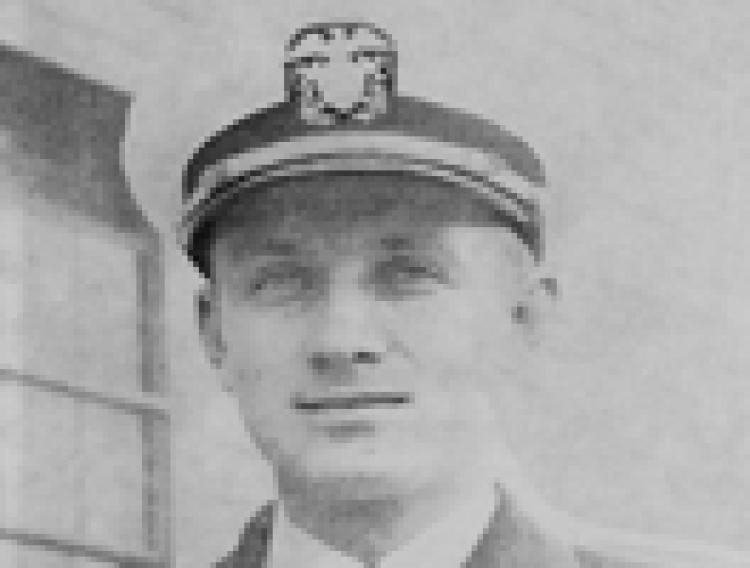Ken Ogren
Ken Ogren was born on a farm in Minnesota in 1918. He served in the US Navy from 1942 to1946. After receiving his BS, MA, and PhD degrees from the University of Minnesota, he worked for the Economic Research Service and Foreign Agricultural Service of the US Department of Agriculture as a research economist, a manager of research in Washington, DC, and in the US diplomatic service in France. Ken and his wife Marjorie became residents of The Academy in 2002.

Click image to enlarge
The Challenge That Changed Everything
“What am I getting into?” I asked myself as I arrived at Ft. Schuyler. I was in tow behind two stripers, both appearing to be in their upper thirties, who led me through the base to where I would find out my orders. I wasn’t exactly thrilled to be where I was, but I guess I was destined to be in the service one way or another. The Navy appealed to me over the Army; I wasn’t cut out for close combat.
We entered a building and I was led to a door that read “Executive Officer.” One of the stripers knocked on the door and from inside a voice boomed, “Come in!” The two other men and I entered the room quickly and saluted. The executive officer returned our salute and then relieved the other two men.
“Kenneth Ogren?” he asked without looking up.
“Yes sir” I replied.
“You are assigned to battalion four. Report to Lieutenant Bailey, the commander of battalion four, for further instructions.” As I left the office of the executive officer at Ft. Schuyler, I was even more confused than when I initially entered the gates.
I found the office of Lieutenant Bailey. Inside the battalion four building, which housed 100 student officers, I discovered that these officers all lived in one large barrack, with double bunk beds set side-by-side. It was quite a surprise to me because as a midshipman, I had a room with one double bunk bed and a well-equipped bathroom between two rooms. Before, I was living in rather sumptuous dormitories of the downtown campus of the Northwestern University. My current living arrangements were quite a letdown from what I had experienced there.
Responsibilities
After finally finding Lieutenant Bailey, I was able to learn a little bit more of what was going to be expected of me. According to Bailey, I would be responsible for instructing the three platoons (that’s 100 men) on the subjects of Naval Law, Naval Correspondence, and Naval Organization. I was also to be responsible for military discipline and drill for one platoon.
As I saluted and turned to walk out the door, my heart dropped. I had never had a responsibility like this before, and I felt as though I was about to have an anxiety attack. The only experience I had as a teacher was back home in Minnesota teaching Sunday school. I loathed public speaking; I had taken one class in that subject at the University of Minnesota and found it to be quite nerve-wracking and uncomfortable. The idea of being in front of people made me cringe.
Even worse, I knew next to nothing about the three subjects I had been assigned to teach. My only experience in the Navy was at the Midshipman School where the only subjects were ordinance, seamanship, and navigation. These were a far cry from the more administrative subjects I was to teach. One thing I was forced to learn early on in the Navy was that you either sink or swim. My other option, should I fail at this assignment, was to be kicked out of the Navy and
sent back to the local draft board in Minnesota, which would surely mean being drafted into the Army. I had to find a way to make this work. I thought I had had
challenges during the summer when dealing with my father’s illness and the tornado that took down his barn (which I helped him rebuild) but they were nothing compared to what I was dealing with now.
The next couple of days were awful. The anticipation of what I had ahead of me was almost too much to bear. One hundred men were going to be looking to me for instructions on things that I knew next to nothing about. All of this was compounded by the fact that the men who were under my command outranked me, a fact that I discovered during the days of orientation when I received a list detailing who my students would be and their past experiences. I also found out that I would have to give them ratings to measure their aptitude and potential as naval officers; these ratings would be due by the beginning of their second month. It was not much time to get well enough acquainted with them so that I could give them meaningful and fair appraisals.

Click image to enlarge
I decided early on that I would be honest with my student officers, who were all older than myself. I wasn’t going to pretend that I knew everything about the subjects; I was just going to be straightforward. Naval Law was not something that I was familiar with, let alone Civilian Law. I met George Waddington in my tenure at Ft. Schuyler and we quickly bonded while reporting to duty together. He had two years of experience under his belt and was able to give me great advice. We quickly became close friends.
This entire experience at Ft. Schuyler really helped prepare me for the challenges later on in life with my professional career and my personal life. I started my career as a researcher and eventually ended up as a manager and a diplomat. I found that I was able to give good public speeches despite my initial fears. I was lucky enough to make contacts with members from Congress and high-ranking officials. I even ended up on the French radio, speaking to the French Minister of Agriculture, Jacques Chirac, who later turned out to be the president of France. I give credit to the experience that I had at Ft. Schuyler; the challenges seemed insurmountable at the time, but I found I was able to meet them with determination and hard work.

